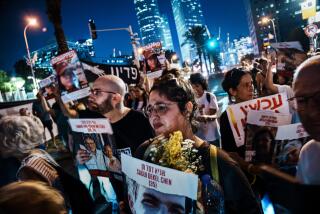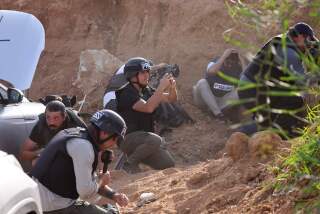Review: An American journalist who was kidnapped by Al Qaeda retraces his steps in ‘Theo Who Lived’
“I committed suicide but I’m still alive” — those were the thoughts of American journalist Theo Padnos when in 2012 he crossed the border from Turkey into Syria to investigate the civil war, only to be set up by his contacts and kidnapped by the local branch of Al Qaeda. In David Schisgall’s involving documentary, “Theo Who Lived,” Padnos revisits the country where he was held, in various locations, for 22 months, and reenacts his experiences in such torture chambers as the “room of death.”
He’s a gifted storyteller relating horrendous events and managing always to connect with what’s human, and even sometimes humorous, in the direst of circumstances. A postscript attests to the depths of his compassion for Syria’s refugees.
The documentary’s title is no boast, but more a statement of empirical fact built on people skills and complicated luck — especially in light of the brutal execution of another journalist kidnapped around the same time, James Foley, and the role his widely reported murder played in Padnos’ ultimate release.
Padnos doesn’t directly address his psychic scars as a survivor, but he repeatedly refers to the foolish risks he took. At the time of his capture he was a struggling freelancer with a facility for language and a taste for danger, his rock climbing a particular source of anguish for his mother, who lost her brother to the sport. Schisgall’s interviews with her enrich the portrait of Padnos, but it’s the journo’s open gaze and natural inquisitiveness, his refusal to merely demonize his abusers, that give the film its discomforting power.
------------
‘Theo Who Lived’
In English and Arabic with English subtitles
Not rated
Running time: 1 hour, 26 minutes
Playing: Laemmle Monica Film Center, Santa Monica
See the most-read stories in Entertainment this hour »
Movie Trailers
More to Read
Only good movies
Get the Indie Focus newsletter, Mark Olsen's weekly guide to the world of cinema.
You may occasionally receive promotional content from the Los Angeles Times.






